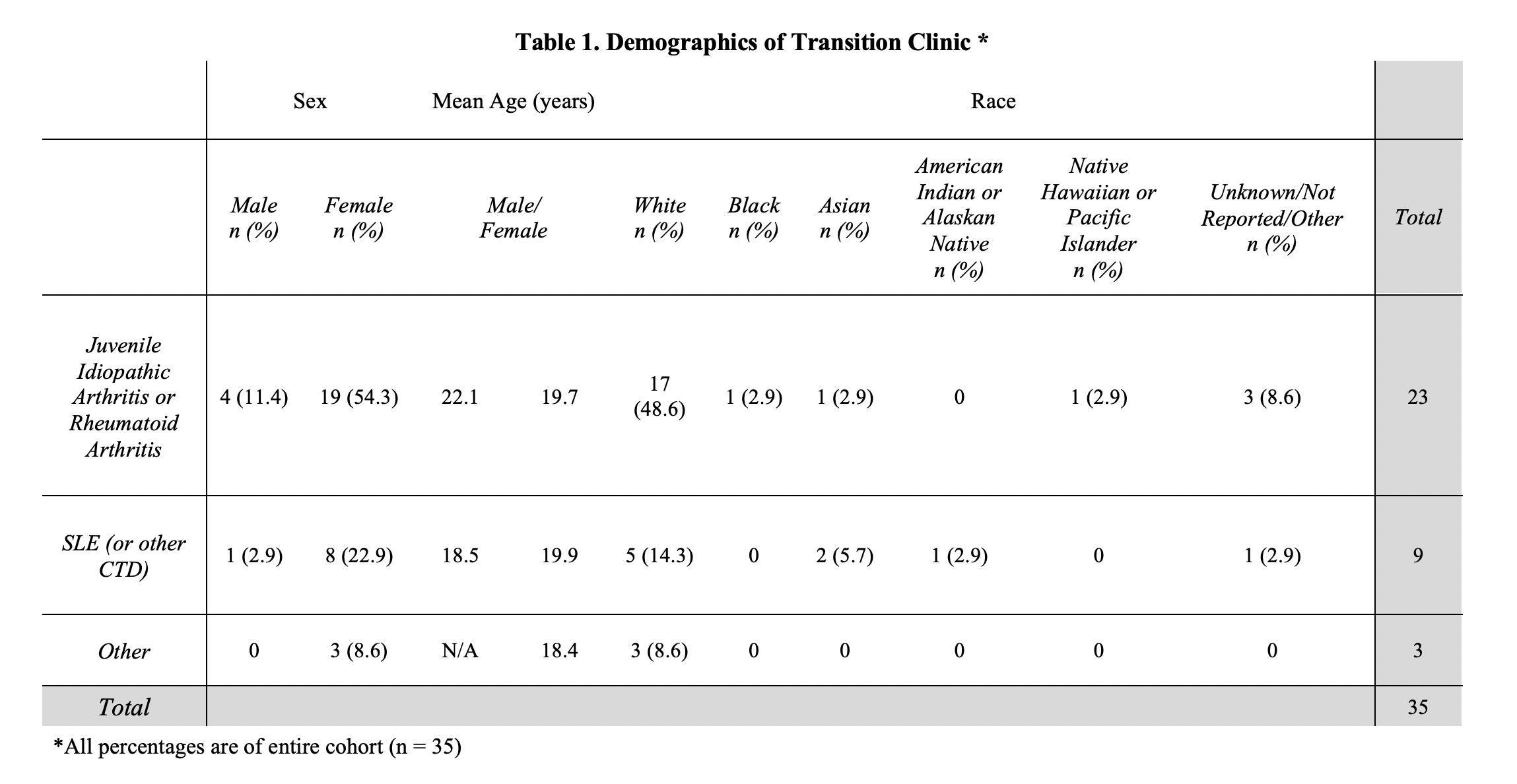Session Information
Session Type: Poster Session B
Session Time: 9:00AM-11:00AM
Background/Purpose: In November 2018 we initiated a transition clinic called ACCORD (Adult Center for Childhood Onset Rheumatic Disease). Our unique structure integrates an adult rheumatologist in a pediatric rheumatology clinic setting to initiate clinical transition of our patients. Patients are seen when they are ≥ 16 years old. All patients and parents receive education on transition planning and provide feedback on their experience.
Methods: Metrics collected in the ACCORD clinic include the ‘Transition Readiness Assessment’ (Got TransitionTM) and the ‘Mind the Gap’ scale, a validated metric using 7-point Likert scales to assess satisfaction with transitional health care among adolescents and young adults (AYA) with chronic illness and their parents. The preliminary data from these metrics were analyzed to evaluate the perspectives and satisfaction of our AYA as well as their parents. Discrete variables are reported as percentages. Linear variables are reported as means and compared using independent one-tailed t-test (p < .05).
Results: 35 families have participated in our transition clinic (Table 1). 25 AYA and 16 parents completed a ‘Transition Readiness Assessment’. On an importance scale from 0 (not) – 100 (very), AYA rated “the importance of preparing for/changing to an adult doctor before the age of 22” as 73.3 (M = 73.3, SD = 32.2). For parents, “how important is it for your child to prepare for/change to an adult doctor before age 22” was rated 77.1 (M = 77.1, SD = 29.3). When asked “how confident do you feel about your ability to prepare for/change to an adult doctor” 0 (not) – 100 (very), AYA responded 67.8 (M = 67.8, SD = 17.2). When asked “how confident do you feel about your child’s ability to prepare for/change to an adult doctor” parents responded 74.9 (M = 74.9, SD = 21.0) (Figure 1). Parents were more confident than AYA, but this change did not reach statistical significance (t(39) = -1.1808, p = .12). AYA and 6 parents completed a ‘Mind the Gap’ scale. For AYA, those variables felt “extremely important” by the majority of respondents included: “does not waste my time at clinic,” and “has staff who are very knowledgeable about my disease and latest treatments” (n = 8, 61.5% for each). For parents, those variables felt “extremely important” by the majority of respondents included: “provides me with honest explanations of my child’s condition and treatment options (including side‐effects),” “provides my child with honest explanations of their condition and treatment options (including side‐effects),” and “helps me and my child prepare for their move to adult services,” (n = 6, 100.0% for each).
Conclusion: This research shows that AYA and their parents believe transition planning and successful clinical transition to an adult sub-specialist is important. Although the difference is not statically significant in this small sample, parents are more confident than AYA in their child’s/own ability to successfully make this transition. Of most value to both AYA and their parents are efficient clinic processes, which include deliberate transition preparation, and are led by knowledgeable staff. Parents especially value honest explanations of their child’s condition and treatment that target both the parent and the AYA.
To cite this abstract in AMA style:
Overbury R, Frech T, Bohnsack J, Inman C, Stern S, James K, Treemarcki E, Hersh A. Patient and Parent Perspectives in a Academic Pediatric Rheumatology Transition Clinic [abstract]. Arthritis Rheumatol. 2020; 72 (suppl 10). https://acrabstracts.org/abstract/patient-and-parent-perspectives-in-a-academic-pediatric-rheumatology-transition-clinic/. Accessed .« Back to ACR Convergence 2020
ACR Meeting Abstracts - https://acrabstracts.org/abstract/patient-and-parent-perspectives-in-a-academic-pediatric-rheumatology-transition-clinic/


